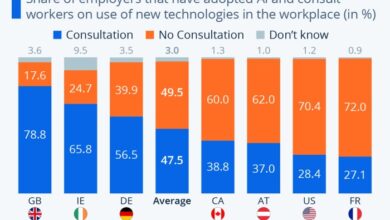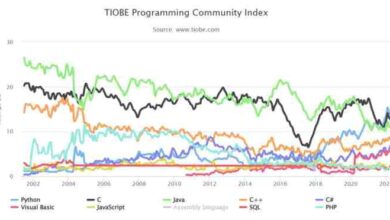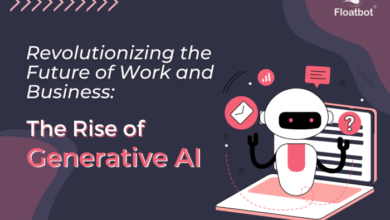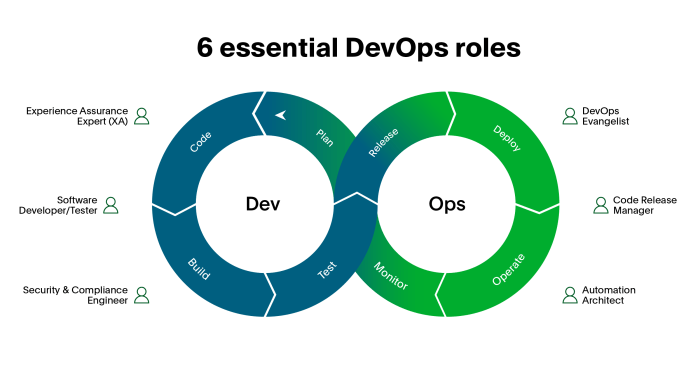
DevOps Engineer Roles and Responsibilities: A Comprehensive Guide
DevOps engineer roles and responsibilities have become increasingly crucial in today’s fast-paced software development landscape. DevOps, short for Development and Operations, represents a collaborative approach that bridges the gap between development and IT operations teams, fostering efficiency, agility, and seamless software delivery.
This approach emphasizes automation, continuous integration, and continuous delivery (CI/CD) practices, enabling organizations to release software faster and more reliably.
At the heart of DevOps teams are DevOps engineers, who play a pivotal role in implementing and maintaining these practices. They are responsible for building, deploying, and managing applications and infrastructure, ensuring smooth and efficient operations. Their responsibilities extend beyond traditional software development, encompassing a wide range of tasks, including infrastructure management, automation, deployment, monitoring, and security.
DevOps Engineer Responsibilities
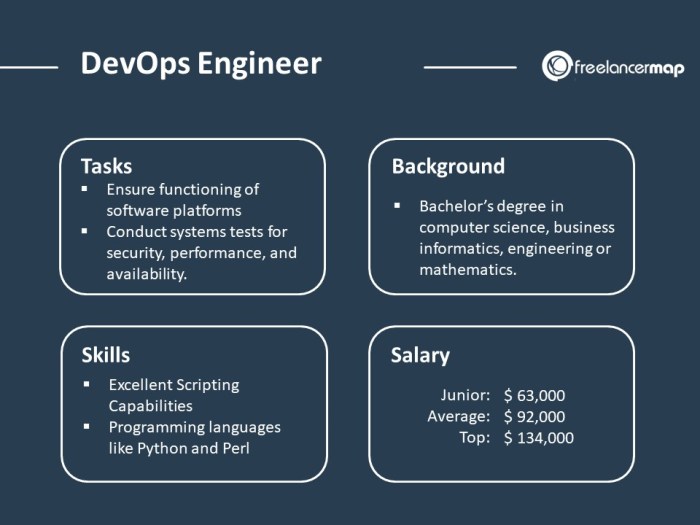
DevOps engineers are essential for organizations seeking to streamline their software development and deployment processes. They bridge the gap between development and operations teams, ensuring smooth and efficient software delivery.
Infrastructure Management
DevOps engineers play a crucial role in managing the infrastructure that supports applications. This includes:
- Provisioning and configuring servers, virtual machines, and cloud resources.
- Managing network configurations, firewalls, and load balancers.
- Monitoring infrastructure health and performance, identifying and resolving issues proactively.
- Automating infrastructure tasks using tools like Terraform and Ansible, reducing manual effort and improving consistency.
Automation
Automation is a core principle of DevOps, and engineers are responsible for automating various aspects of the software development lifecycle. This includes:
- Building and testing applications using Continuous Integration and Continuous Delivery (CI/CD) pipelines.
- Automating deployments to different environments, such as development, staging, and production.
- Creating scripts and tools for automating repetitive tasks, such as provisioning databases or configuring applications.
Deployment
DevOps engineers are responsible for deploying applications to production environments efficiently and reliably. This involves:
- Using containerization technologies like Docker to package applications and their dependencies.
- Orchestrating container deployments using tools like Kubernetes, ensuring scalability and high availability.
- Implementing strategies for rolling updates and blue-green deployments to minimize downtime during upgrades.
- Monitoring deployments for success and addressing any issues that arise.
Monitoring
Continuous monitoring is essential for identifying and resolving issues before they impact users. DevOps engineers are responsible for:
- Setting up monitoring systems to track application performance, resource utilization, and user experience.
- Using tools like Prometheus, Grafana, and Datadog to visualize and analyze monitoring data.
- Creating alerts for critical events and setting up automated remediation processes to address issues promptly.
Security
Security is a top priority in DevOps, and engineers play a crucial role in implementing security best practices throughout the software development lifecycle. This includes:
- Integrating security tools into CI/CD pipelines to perform vulnerability scans and penetration testing.
- Implementing secure coding practices and enforcing security policies.
- Managing user access and permissions, ensuring only authorized individuals have access to sensitive information.
- Monitoring for security threats and responding to incidents effectively.
Hypothetical Workflow
Consider a scenario where a DevOps engineer is responsible for deploying and maintaining a new e-commerce application. The workflow might look like this:
- Code Development and Testing:Developers commit code changes to a Git repository, triggering automated builds and tests through a CI/CD pipeline.
- Containerization:The application is packaged into a Docker container, ensuring consistent deployment across environments.
- Infrastructure Provisioning:The DevOps engineer uses Terraform to provision the necessary infrastructure on a cloud platform, such as AWS or Azure, based on the application’s requirements.
- Deployment:The containerized application is deployed to a Kubernetes cluster, utilizing automated scaling and load balancing features.
- Monitoring and Logging:Monitoring tools are set up to track the application’s performance, resource usage, and user activity. Logs are collected and analyzed for troubleshooting and performance optimization.
- Security Measures:Security tools are integrated into the CI/CD pipeline to perform vulnerability scans and penetration testing. Access control measures are implemented to secure the application and infrastructure.
- Continuous Improvement:The DevOps engineer continuously monitors the application and infrastructure, identifies areas for improvement, and implements changes to enhance performance, security, and scalability.
Tools and Technologies
DevOps engineers utilize a wide range of tools and technologies to perform their responsibilities effectively. Some commonly used tools include:
- Version Control Systems:Git is a popular choice for managing code changes, facilitating collaboration and tracking revisions.
- Containerization:Docker is widely used to package applications and their dependencies into portable containers, simplifying deployment and ensuring consistency across environments.
- Container Orchestration:Kubernetes is a powerful platform for orchestrating container deployments, providing features like automated scaling, load balancing, and self-healing capabilities.
- Infrastructure as Code:Terraform and Ansible are tools for automating infrastructure provisioning and configuration, enabling repeatable and consistent deployments.
- CI/CD Pipelines:Jenkins, GitLab CI/CD, and CircleCI are popular platforms for building and automating CI/CD pipelines, streamlining the software development process.
- Monitoring and Logging:Prometheus, Grafana, and Datadog are commonly used for monitoring application performance, resource usage, and identifying potential issues.
- Cloud Platforms:Amazon Web Services (AWS), Microsoft Azure, and Google Cloud Platform (GCP) provide a wide range of cloud services, including compute, storage, networking, and databases, enabling scalable and flexible infrastructure solutions.
Technical Skills for DevOps Engineers: Devops Engineer Roles And Responsibilities
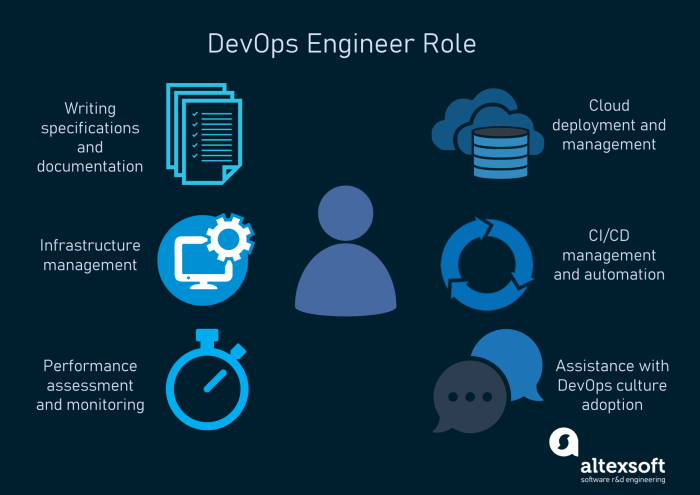
DevOps engineers are in high demand, and for good reason. They are the bridge between development and operations, ensuring that software is delivered quickly, reliably, and efficiently. To succeed in this role, DevOps engineers need a strong foundation in technical skills, which are essential for automating processes, managing infrastructure, and ensuring smooth software delivery.
Scripting and Automation
Scripting and automation are essential for DevOps engineers to streamline tasks and reduce manual effort. This involves writing scripts to automate repetitive processes, such as deploying applications, configuring servers, and running tests. Popular scripting languages used in DevOps include:
- Python: A versatile language with extensive libraries for system administration, web development, and data analysis.
- Bash: A powerful shell scripting language commonly used for automating tasks on Linux and macOS systems.
- PowerShell: A scripting language developed by Microsoft for automating tasks on Windows systems.
DevOps engineers can leverage these skills to automate complex workflows, freeing up time for more strategic tasks.
DevOps engineers are masters of automation, streamlining workflows and ensuring smooth software delivery. But sometimes, even the most dedicated DevOps pro needs a break from the command line. For a sweet escape, check out this how to make cakesicles guide.
Just like automating tasks, creating these delicious treats requires precision and attention to detail. Once you’ve mastered the art of cakesicles, you’ll be back to tackling those complex deployment pipelines with renewed energy!
Cloud Computing, Devops engineer roles and responsibilities
Cloud computing platforms, such as AWS, Azure, and GCP, are integral to modern DevOps practices. DevOps engineers need to be familiar with cloud concepts, services, and tools. They should be able to provision and manage cloud resources, deploy applications in the cloud, and utilize cloud-based monitoring and logging tools.
DevOps engineers are crucial for streamlining software development and deployment, often working across teams to ensure seamless collaboration. It’s interesting to see how leadership changes, like the recent appointment of Ms. Ludivine Wouters as a non-executive director at Euro Manganese, as reported in this article , can impact a company’s approach to technology and innovation.
Ultimately, a strong DevOps team is vital for any organization looking to leverage technology effectively and stay ahead of the curve.
- Virtualization: Understanding how virtualization works is essential for efficient resource utilization and flexibility in the cloud.
- Infrastructure as Code (IaC): IaC tools, such as Terraform and CloudFormation, allow DevOps engineers to define and manage cloud infrastructure using code, promoting consistency and reproducibility.
- Serverless Computing: Utilizing serverless platforms like AWS Lambda and Azure Functions allows DevOps engineers to focus on code without managing server infrastructure.
Containerization
Containerization technologies, such as Docker and Kubernetes, are essential for packaging and deploying applications in a consistent and portable manner. DevOps engineers need to understand containerization concepts, be able to build and manage container images, and orchestrate containers using tools like Kubernetes.
- Docker: Docker allows developers to package applications and their dependencies into containers, ensuring consistent execution across different environments.
- Kubernetes: Kubernetes is an open-source container orchestration platform that automates the deployment, scaling, and management of containerized applications.
Infrastructure as Code (IaC)
IaC is a crucial aspect of DevOps, enabling engineers to define and manage infrastructure using code rather than manual processes. This approach promotes consistency, reproducibility, and version control for infrastructure changes.
DevOps engineers are the glue that holds software development and IT operations together, ensuring smooth and efficient delivery of applications. Their responsibilities span everything from automating infrastructure to optimizing workflows, and sometimes, they even get to take a break and explore a new city! If you’re looking for a fun and vibrant place to visit, I highly recommend checking out the New Orleans Louisiana travel guide.
After a weekend of jazz, beignets, and exploring the French Quarter, you’ll be back to your DevOps tasks with renewed energy and a fresh perspective.
- Terraform: A popular IaC tool that allows engineers to define and manage infrastructure across multiple cloud providers using a declarative configuration language.
- Ansible: Ansible is an agentless automation tool that simplifies infrastructure management tasks, including provisioning, configuration, and deployment.
- Chef: Chef is a configuration management tool that uses a domain-specific language (DSL) to define infrastructure configurations and automate their application.
DevOps Tools and Technologies
| Tool/Technology | Key Features | Use Cases |
|---|---|---|
| Jenkins | Continuous integration and continuous delivery (CI/CD) server | Automating builds, tests, and deployments |
| GitHub | Version control system and collaboration platform | Code management, issue tracking, and collaboration |
| Ansible | Agentless automation tool for infrastructure management | Provisioning, configuration, and deployment automation |
| Docker | Containerization platform for packaging and deploying applications | Creating and managing container images, deploying applications consistently |
| Kubernetes | Container orchestration platform for managing containerized applications | Deploying, scaling, and managing containerized applications across clusters |
| Terraform | Infrastructure as code (IaC) tool for defining and managing infrastructure | Provisioning and managing cloud resources, automating infrastructure setup |
Real-World Examples
DevOps engineers leverage their technical skills to solve real-world problems in various ways.
- Automating Deployments: By using CI/CD tools like Jenkins and scripting languages like Python, DevOps engineers can automate the deployment process, reducing manual errors and speeding up delivery times.
- Managing Cloud Infrastructure: Using IaC tools like Terraform, DevOps engineers can provision and manage cloud resources efficiently, ensuring scalability and cost optimization.
- Improving Application Performance: By monitoring application performance and utilizing tools like Prometheus and Grafana, DevOps engineers can identify bottlenecks and optimize application performance.
Soft Skills for DevOps Engineers
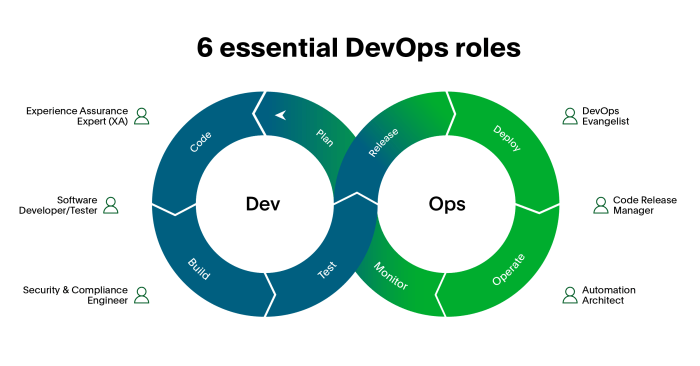
While technical skills are crucial for DevOps engineers, soft skills are equally important for success in this collaborative and dynamic field. Soft skills enable DevOps engineers to effectively communicate, collaborate, and adapt to the ever-changing demands of modern software development.
Communication Skills
Effective communication is vital for DevOps engineers to work seamlessly within a team and with stakeholders. DevOps engineers need to clearly and concisely convey technical concepts to non-technical audiences, such as product managers or business analysts. They must also be able to actively listen and understand the needs and concerns of team members, fostering a transparent and collaborative environment.
- Active Listening:DevOps engineers must be attentive listeners, actively engaging with colleagues and stakeholders to fully understand their perspectives and requirements. This involves paying close attention, asking clarifying questions, and summarizing information to ensure accurate comprehension.
- Clear and Concise Communication:DevOps engineers need to communicate technical information in a way that is easily understood by individuals with varying levels of technical expertise. They must use clear language, avoid jargon, and provide relevant examples to ensure effective knowledge transfer.
- Effective Documentation:Comprehensive documentation is crucial for DevOps engineers to share knowledge, maintain consistency, and facilitate collaboration. They should document processes, tools, and solutions in a clear and accessible manner, ensuring that information is readily available to team members.
Collaboration Skills
DevOps engineers work closely with various teams, including developers, testers, and operations personnel. Strong collaboration skills are essential to foster a cohesive and productive work environment. DevOps engineers must be able to work effectively within diverse teams, contribute their expertise, and actively participate in decision-making processes.
- Teamwork:DevOps engineers should embrace a collaborative approach, actively contributing to team goals and supporting colleagues. They should be willing to share knowledge, assist with tasks, and work effectively as part of a larger team effort.
- Conflict Resolution:Disagreements and conflicts can arise in any team environment. DevOps engineers should be able to effectively manage conflicts, facilitate open discussions, and seek mutually beneficial solutions.
- Respectful Communication:Maintaining a respectful and professional communication style is essential for fostering a positive and productive work environment. DevOps engineers should communicate with colleagues and stakeholders in a courteous and considerate manner, regardless of differing opinions or perspectives.
Problem-Solving Skills
DevOps engineers are often tasked with identifying and resolving complex technical issues. Strong problem-solving skills are crucial for them to analyze situations, identify root causes, and develop effective solutions. They should be able to think critically, analyze data, and implement solutions in a timely and efficient manner.
- Analytical Thinking:DevOps engineers should possess strong analytical skills to break down complex problems into manageable components. They must be able to identify patterns, analyze data, and draw logical conclusions to effectively diagnose and resolve issues.
- Creative Solutions:DevOps engineers often face unique challenges that require innovative solutions. They should be able to think outside the box, explore different approaches, and develop creative solutions to address complex problems.
- Root Cause Analysis:DevOps engineers should be able to conduct thorough root cause analyses to identify the underlying reasons for technical issues. This involves investigating symptoms, gathering data, and analyzing patterns to determine the root cause of a problem, ensuring that it is addressed effectively and permanently.
Adaptability Skills
The DevOps landscape is constantly evolving, with new technologies and approaches emerging regularly. DevOps engineers need to be adaptable and willing to learn new skills to stay current with industry trends and effectively contribute to the team’s success.
- Continuous Learning:DevOps engineers should embrace a continuous learning mindset, actively seeking opportunities to expand their knowledge and skills. They should stay abreast of industry trends, explore new technologies, and participate in training programs to enhance their capabilities.
- Flexibility:DevOps engineers should be flexible and adaptable to changing priorities and demands. They must be able to adjust their work approach, embrace new tools and technologies, and effectively respond to evolving project requirements.
- Resilience:DevOps engineers should be resilient and able to handle setbacks and challenges with a positive attitude. They should be able to learn from mistakes, adapt to unexpected situations, and maintain focus on achieving project goals.
DevOps Career Path
A career in DevOps offers a dynamic and rewarding path, with opportunities for growth and specialization. From entry-level positions to senior roles and leadership opportunities, there’s a place for everyone with the right skills and dedication.
Educational and Professional Certifications
Educational qualifications and professional certifications can significantly enhance a DevOps engineer’s career prospects. These credentials demonstrate a commitment to professional development and can make you a more competitive candidate in the job market.
- Formal Education:A bachelor’s degree in computer science, software engineering, or a related field is often preferred for entry-level positions. However, individuals with strong technical skills and relevant experience may be able to enter the field with an associate degree or even a certificate program.
- Professional Certifications:Several industry-recognized certifications can validate your DevOps expertise. Some popular options include:
- AWS Certified DevOps Engineer- Professional: This certification demonstrates proficiency in designing, deploying, and operating cloud applications on AWS.
- Azure DevOps Engineer Expert:This certification validates expertise in using Azure DevOps for continuous integration and continuous delivery (CI/CD) processes.
- Google Cloud Professional Cloud DevOps Engineer:This certification validates expertise in using Google Cloud Platform for DevOps practices.
- Certified Kubernetes Administrator (CKA):This certification demonstrates proficiency in managing and operating Kubernetes clusters.
- Docker Certified Associate (DCA):This certification validates knowledge of Docker containerization technology.
Developing Skills and Experience
For aspiring DevOps engineers, building the necessary skills and experience is crucial for career success. Here are some tips:
- Focus on Core Skills:Master the fundamentals of automation, scripting, cloud computing, containerization, and CI/CD. This foundation will enable you to adapt to new technologies and challenges in the field.
- Gain Practical Experience:Participate in open-source projects, build personal projects, or contribute to a company’s DevOps initiatives. Real-world experience is invaluable for demonstrating your abilities to potential employers.
- Stay Updated:The DevOps landscape is constantly evolving. Stay current with the latest trends, technologies, and best practices by reading industry blogs, attending conferences, and pursuing relevant certifications.
- Network with Others:Connect with other DevOps professionals through online communities, meetups, and industry events. Networking can provide valuable insights, mentorship opportunities, and potential job leads.



